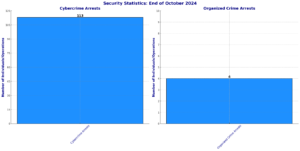SECURITY REPORT: END OF OCTOBER 2024

The recent security developments in Nigeria reveals complex and evolving landscape marked by both escalating threats and critical law enforcement actions. The Nigeria Police Force made a significant breakthrough by arresting 113 foreign nationals from China and Malaysia for involvement in high-level cybercrimes (Figure 1). This effort is a clear attempt to curb the growing menace of international participation in Nigeria’s cybersecurity threats. However, controversial incidents involving law enforcement have also drawn public criticism. In Anambra, a police officer shot and killed a commercial bus driver during an altercation over a mere N100 bribe. This killing has sparked outrage and renewed debate over police brutality and misconduct. In a separate matter, reports about a supposed altercation involving military personnel at the Rivers Government House were swiftly debunked by the Rivers State Police Command. This incident shows the persistent issue of misinformation in politically sensitive environments which further complicates governance and security discourse in the country.
In Ebonyi State, the issue of organized crime remains dire, as police recently arrested four suspects involved in human organ harvesting. This case forms part of a broader wave of insecurity tied to ritual killings, reflecting significant challenges in the fight against organized crime across Nigeria. Meanwhile, human rights violations are also a critical concern. In Abuja, 67 minors were arraigned for participating in the #EndBadGovernance protests. The arrest of these minors has attracted condemnation from prominent figures, including Rabiu Kwankwaso, who has voiced concerns about the government’s use of force during peaceful demonstrations, highlighting serious human rights concerns in law enforcement practices.
On a more positive note, President Bola Tinubu has reiterated his administration’s commitment to ending kidnapping, banditry, and terrorism. Addressing gatherings in states like Katsina and Kaduna, Tinubu emphasized stronger collaboration with security agencies to tackle these forms of criminality. The recent rescue of a kidnapped doctor in Kaduna stands as evidence of successful inter-agency cooperation in combating kidnapping, and such actions have received commendation from the Federal Government.
Nevertheless, other challenges persist, especially in volatile areas like Rivers State. Political tensions have heightened to the point that ex-agitators threatened to blow up oil installations, which prompted the Movement for the Emancipation of the Niger Delta (MEND) to condemn these threats. This situation shows the precarious peace in oil-producing regions, where political disputes could have far-reaching implications for national security and the economy.
Border security is another area receiving attention. The Nigerian Immigration Service (NIS) announced plans to leverage technology to improve border control and manage illegal immigration. As part of these efforts, NIS also promoted nearly 14,000 officers to bolster security operations across the country. These initiatives represent proactive steps to address long-standing security issues at Nigeria’s borders, which have often been exploited for smuggling and illegal crossings.

Figure 1: Visual of Key Security Statistics
Generally, the security situation in Nigeria remains mixed. The commendable achievements include cybercrime arrests and successful rescue operations contrasting starkly with incidents of police misconduct, threats to journalists, and political instability in key regions (Figure 2). The government’s commitment to tackling these issues, paired with technological investments in border control, presents a hopeful yet challenging path toward stability.

